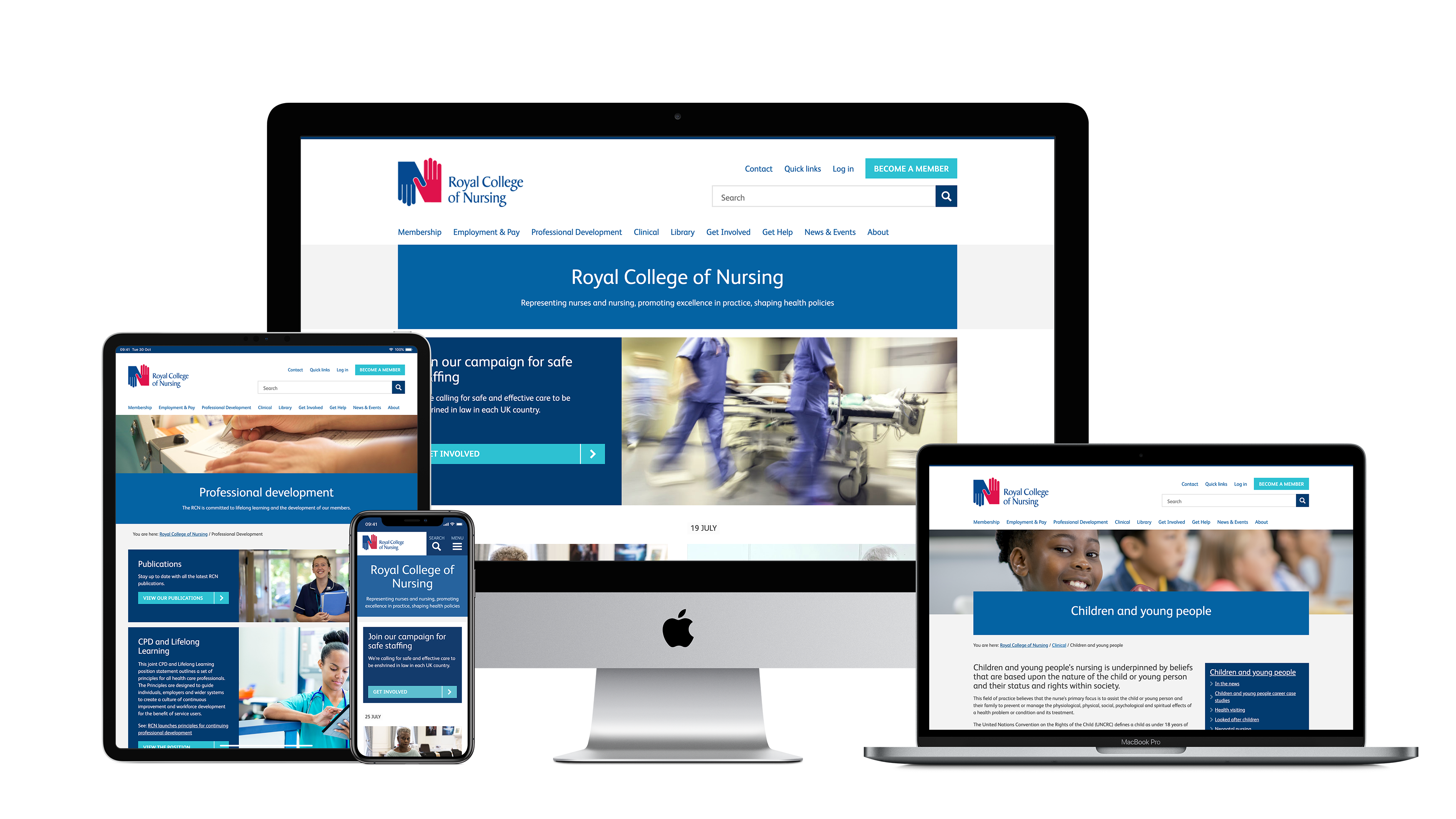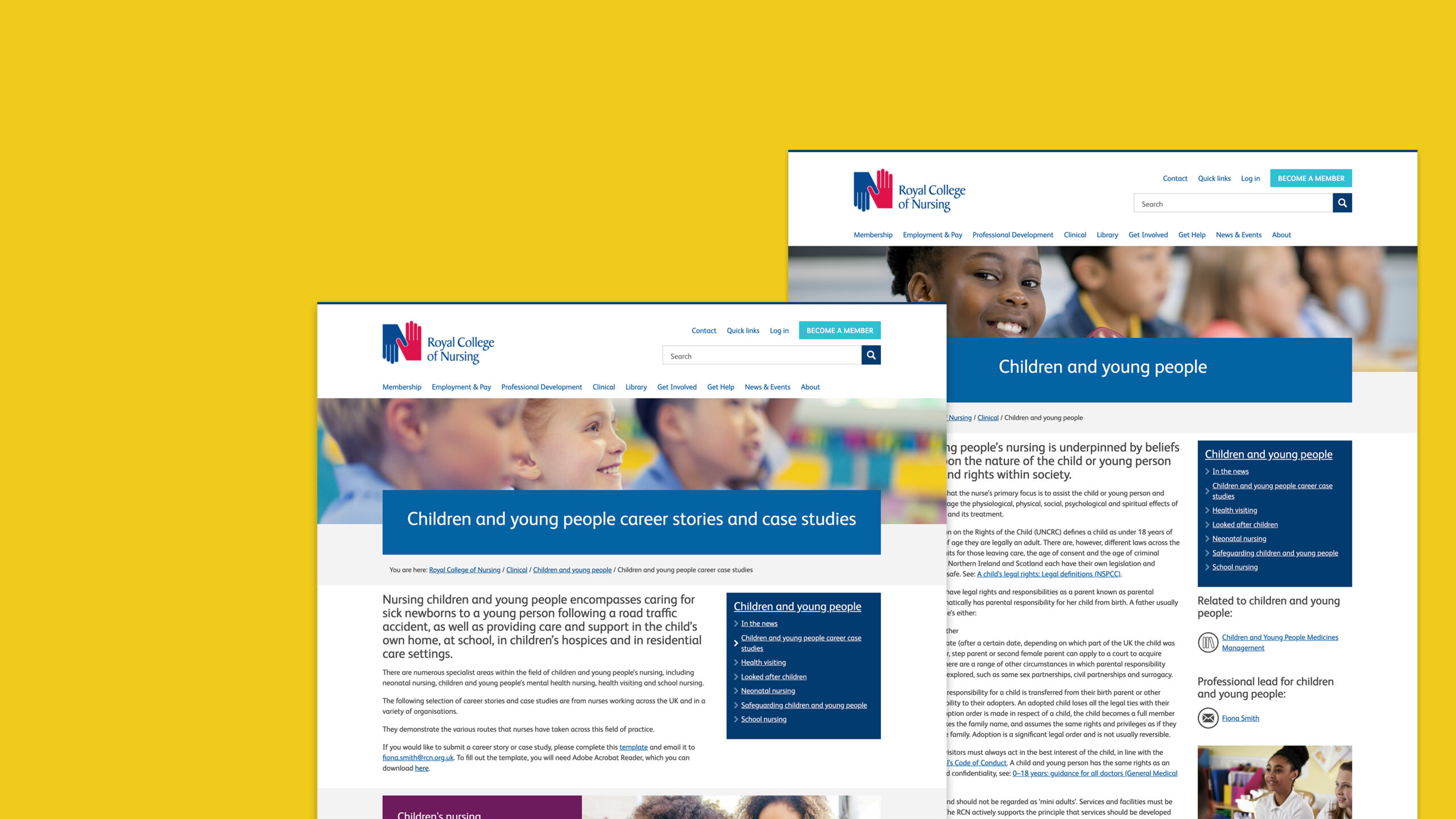
RCN Usability Testing
Empowering RCN’s digital transformation with actionable insights from 114 member testing sessions.
Client
Royal College of Nursing
Sector
Membership
Services
Sitecore Development
Supporting the Royal College of Nursing’s digital transformation plans with insight from 114 guerrilla usability testing sessions.
When you’re investing in a digital transformation project, you want to be certain it’s on course to achieve your key strategic goals. And when you’re a 440,000-strong global membership organisation such as the Royal College of Nursing (RCN), that means making sure you don’t just meet member needs but exceed them, by delivering a truly exceptional online experience.
That’s why, with the help of Box UK’s User Experience (UX) consultants, the Royal College of Nursing used their annual RCN Congress to find out what members thought about their brand-new digital platform, while it was still in beta.
Our consultants used a combination of usability testing approaches to gather feedback, including conducting 114 guerrilla testing sessions over the course of three days. From this, they extracted insight to help guide future development plans – producing a series of prioritised recommendations for the RCN to take away.

A flexible testing framework
With Congress playing host to over 5,000 attendees, we knew there’d be no shortage of opportunities to speak to members about the RCN’s new digital platform. To take advantage of this though, we first had to define a holistic programme of work that would deliver the relevant, valuable information we needed in the limited time we had available.
Deciding that guerrilla testing, with its portable equipment and stripped-down test plans, offered the ideal solution, we made this the focus of our testing framework. Armed with a selection of desktop, tablet and smartphone devices we set ourselves up in a high-traffic area of the conference space and asked attendees to take just 10-15 minutes out of their day to explore the platform and share their initial thoughts. This lightweight approach proved hugely successful – enabling us to get through a staggering 114 sessions during our time at Congress.
This impressive volume of tests was achieved through the application of a number of clever testing techniques that enabled us to capture as much data as possible and so provide the RCN with richer, more useful insights. Third-party software was used to enable attendees to work through the tests by themselves while our consultants were conducting moderated sessions, while interviews, questionnaires and feedback cards were all used to help complete the picture of member opinion.
“The way the Box UK team conducted things was fantastic and the response and feedback we have captured I am sure will prove invaluable to the further development of the website. It was an absolute pleasure to work with you.”
Paul Newman, Head of IT, the Royal College of Nursing
Extracting insight
Having previously completed an in-depth discovery phase for the RCN we already had a pretty good idea of the most important user journeys across the site, and crafted bespoke test plans that focused on these specifically. Following testing, our UX consultants were able to drill down further into areas of particular interest by analysing the heatmaps that had been generated from users’ cursor movements, and the journeys that plotted how they moved between different areas of the site.
This quantitative insight helped shape our final recommendations, and was enhanced by qualitative feedback gathered through the questionnaires filled out by users. Again, a mix of moderated and unmoderated approaches was used here to generate a wide variety of responses in a short space of time – helping us get to the very heart of what users did and didn’t find useful about the new platform. We also used this opportunity to define a Net Promoter Score for the RCN, providing stakeholders from across the organisation with an immediate, high-level overview of member feeling towards the redesign (which, incidentally, was extremely positive).

Delivering results
Following analysis of the raw data, our consultants presented the RCN with a series of recommendations to help them refine and enhance the platform as it entered the next stage of beta development. Armed with this expert guidance, based on real-world feedback, they could be sure that user needs would be fully embedded into the platform, helping increase confidence in the quality of the finished product. And because we’d conducted so many tests, the findings could be segmented to reflect the RCN’s different target audiences – which range from qualified nurses and students to health practitioners and accredited representatives – to help them prioritise their next steps according to the value that would be delivered.
It wasn’t just RCN stakeholders that experienced the benefits of usability testing, however. By taking our lab to members directly, we were able to get them involved in the project at the earliest possible stage. This kind of collaborative approach has been shown to encourage faster adoption of new digital products and services – so we weren’t just demonstrating progress and providing reassurance that all feedback was being taken on board, but also helping safeguard eventual take-up of the finished solution.
Talk to one of our digital experts

Tom Houdmont
Head of Business Solutions
Do you have a great idea for a project you need support with?
Tom leads Box UK’s Business Solutions team and has over 15 years experience in the web industry. Tom is passionate about creating impactful solutions that solve real problems and deliver the outcomes our clients need.
Or call us on 020 7439 1900
Related case studies
Have a project you’d like to discuss?
Give us a call on 020 7439 1900 or fill in the form and we will get back to you.


